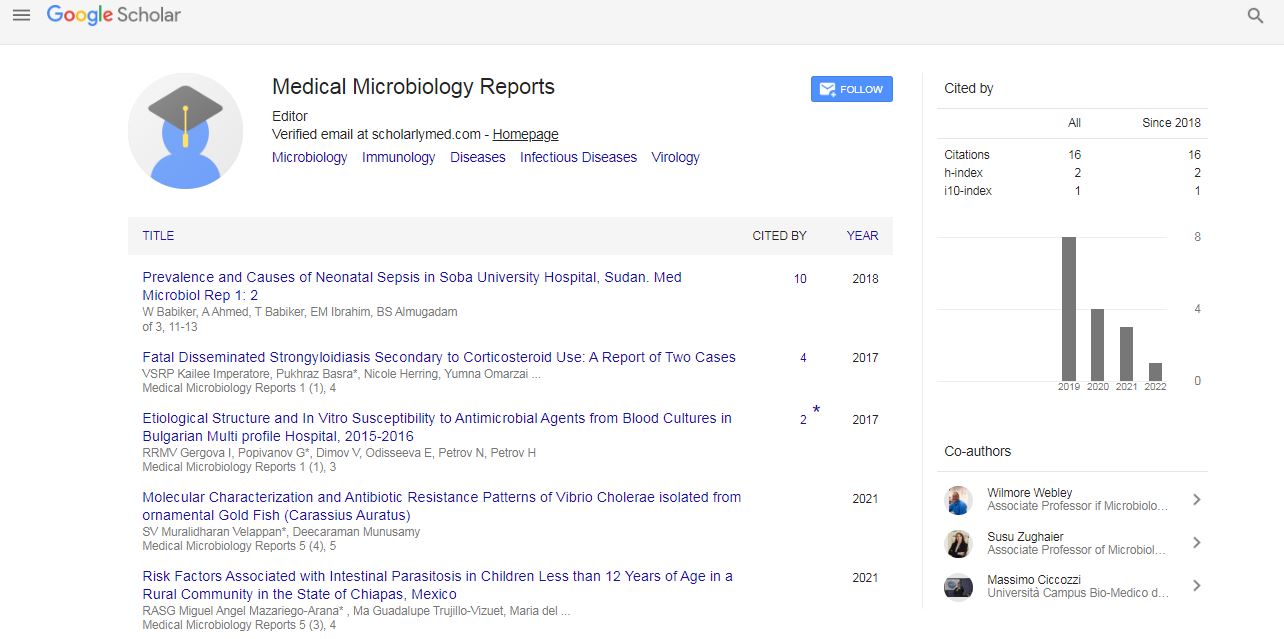Perspective, Med Microbiol Rep Vol: 7 Issue: 4
Interpreting Microbial Cultures, Methods, Impact and Significance
Emilio Omsland*
1Department of Environmental Biotechnology, University of Natural Resources and Life Sciences, Vienna, Austria
*Corresponding Author: Emilio Omsland,
Department of Environmental
Biotechnology, University of Natural Resources and Life Sciences, Vienna,
Austria
E-mail: emiliomsla@uonrls.ac.at
Received date: 24 November, 2023, Manuscript No. MMR-24-128560;
Editor assigned date: 27 November, 2023, PreQC No. MMR-24-128560 (PQ);
Reviewed date: 11 December, 2023, QC No. MMR-24-128560;
Revised date: 18 December, 2023, Manuscript No. MMR-24-128560 (R);
Published date: 26 December, 2023, DOI: 10.4172/MMR.1000361
Citation: Omsland E (2023) Interpreting Microbial Cultures, Methods, Impact and Significance. Med Microbiol Rep 7:4.
Description
Microbial cultures serve as the heart of microbiological analysis, providing a glance into the complex world of microscopic life. It explores the methods employed to explore microbial cultures and elucidates their profound significance in various scientific, medical and industrial applications. The expedition into microbial cultures often begins with isolation techniques. Microorganisms are isolated from diverse sources such as soil, water or clinical samples. Techniques like streak plating and serial dilution help obtain pure cultures for in-depth analysis. Culturing and growth media constitute foundational elements in microbial analysis, providing the requisite environments for microbial proliferation. Various types of media, including agar plates, liquid broths and specialized formulations customized to specific microorganisms, are employed by analysts to ensure optimal conditions for growth. The maintenance of microbial culture purity is maintained by sterilization methods such as autoclaving and filtration, eliminating unwanted contaminants and establishing a pristine environment.
The advent of molecular biology techniques has revolutionized the study of microbial cultures. Polymerase Chain Reaction (PCR), DNA sequencing and metagenomics enable the identification and characterization of microbes at the genetic level, providing a comprehensive understanding of microbial diversity. Exploring microbial cultures yields multifaceted impacts across diverse fields. In biotechnology, microbial cultures form the backbone of innovations, contributing to the production of enzymes, antibiotics and biofuels.
Genetic engineering techniques allow the customization of microbial behavior, propelling advancements with extensive uses. The study of microbial cultures serves as a powerful tool for environmental monitoring, with microorganisms acting as indicators that reflect changes in ecosystems. This information is pivotal for sustainable resource management, pollution control and conservation efforts.
In medical analysis and diagnostics, microbial cultures play a fundamental role in identifying and characterizing pathogenic microorganisms, informing treatment strategies and supporting the development of antibiotics and vaccines. The food and beverage industry extensively relies on microbial cultures, utilizing fermentation processes to enhance flavors and textures, as well as preserving various products. Microbial contributions are integral to the production of a wide array of consumables. In wastewater treatment plants, microbial cultures actively break down organic matter, contributing to the purification of water resources and supporting sustainable practices in waste management. The pharmaceutical industry benefits significantly from microbial cultures, employing them in the production of therapeutic proteins and vaccines. Microbial expression systems provide efficient platforms for large-scale production, expediting the development of essential pharmaceuticals.
Conclusion
The exploration of microbial cultures has the greatest significance in various aspects. Microbial cultures embody the vast biodiversity within ecosystems, influencing nutrient cycles and ecological balance. The complex relationships between microorganisms and their environments contribute to the overall health of ecosystems. In agriculture, microbial cultures contribute to sustainable practices through the development of bio-fertilizers and bio-pesticides, enhancing crop yields while minimizing environmental impact. Understanding microbial cultures also opens avenues for bioremediation, as certain microorganisms possess the ability to break down pollutants, providing environmentally friendly solutions to remediate contaminated sites. The exploration of microbial cultures is a multifaceted endeavor with extensive implications. From biotechnological advancements to environmental stewardship and medical innovations, the significance of microbial cultures cannot be overstated. As technology continues to evolve, the understanding of these microscopic communities will maximize, opening new avenues for scientific discovery and innovation.
 Spanish
Spanish  Chinese
Chinese  Russian
Russian  German
German  French
French  Japanese
Japanese  Portuguese
Portuguese  Hindi
Hindi 
